
According a French liberal MEP, the "landmark decision" is a matter of European values.Continue reading

With a right-wing majority in the European Parliament (EP), a new era could perhaps begin in the next term, Justice Minister Judit Varga said in an interview published in the Italian daily Libero on Sunday, in which she also touched on the child protection law, Italian-Hungarian relations, relations with Russia and migration.
Judit Varga said that Italy’s abstention from the 15 EU member states that joined the lawsuit against Hungary’s Child Protection Act was a sign that the Italian government alone could understand that Hungary had strong arguments in this dispute. She stressed that, in line with the EU Charter of Fundamental Rights, the Hungarian Child Protection Act clearly states that parents and families have the right to decide on the upbringing of their children according to their philosophical and pedagogical convictions. There is therefore no contradiction between the law and European legislation.
According to Judit Varga, the government has touched a sensitive point,
the gender lobby is present in many countries, and this politically and ideologically motivated reaction is due to this”.
The law enjoys broad social support in Hungary, she said: in a referendum held on the day of last year’s parliamentary elections, more people supported the law than voted for the governing parties.
The Justice Minister expressed the hope that the Court of Justice of the European Union would recognize Hungary’s arguments. The rule of law must prevail in the EU, she stressed, adding that the debate is ongoing, will be long and she does not expect a ruling this year.
She also said that bilateral relations with the parties of the current Italian governing coalition and Giorgia Meloni were already good before the politician became prime minister and remained so. There is agreement on many strategic issues, such as immigration policy and the protection of families. She said it was important that the Italian prime minister remained strong so that they could stand together in the European Council to defend conservative values.
Judit Varga added that in her meetings with Italian ministers Carlo Nordio and Raffaele Fitto, they particularly agreed on the priorities of the Hungarian EU Presidency, which will start on 1 July 2024, with the European demographic challenge at the top of the agenda. European society is ageing, which is why families need to be supported. Immigration cannot be the answer, and Hungary and Italy must join forces on these issues, she emphasized.
Regarding Russia, the Minister called the Russian relations a pragmatic issue. According to her, if we want to provide energy to Hungary, we have to do business with Moscow. She pointed out that Hungary has no maritime exit and that although the government has done its best to create links with neighboring countries in recent decades, the gas pipelines connecting it to Slovakia and Austria do not change the fact that the main source is still Russian gas.
On the war in Ukraine, she said: Hungary has condemned Russian aggression from the outset, stands by Ukraine’s independence and territorial integrity, and was among the first to propose Ukraine’s EU membership. Judit Varga sees the escalation of arms supplies as dangerous, as it could “end in a nuclear confrontation”. She said that the only way to stop the conflict is an immediate ceasefire and peace talks, which is supported by Hungarian public opinion.
On migration, the Minister emphasized that she agreed with Italian President Sergio Mattarella that the Dublin Agreement was outdated, but that the introduction of a redistribution mechanism would be an invitation letter to the EU. She stressed that a completely new strategy is needed, and that
we should not deal with the consequences of immigration, but with its causes, adding that instead of bringing the problem to Europe, the solution should be brought to the source of the problem.
The redistribution mechanism is about the mandatory distribution of immigrants between EU member states. In the framework of this mechanism, every EU country should welcome a given number of migrants. The main element of this idea is solidarity towards those member states that are heavily burdened by the large number of immigrants, such as Italy or Greece.
On the fact that Hungarian governing party Fidesz is currently not a member of any EU political group, she said “we are in the land of the strong and we are happy”. Recalling the governing parties’ two-thirds victory in last year’s elections, she added that
although they are not part of a European party family, they are part of a large community of the continental right. It is growing stronger and must have one goal: to convince itself that it can defeat the left and win a majority in next year’s European elections.
According to Judit Varga, this can be achieved because progressives, socialists and left-liberals are incapable of responding to the real needs of European citizens. With a right-wing majority in the next European Parliament, she said, a new era could perhaps begin, with a new European Commission in which bureaucracy and NGOs can no longer override the democratic process. Where the leaders of the member states will set the direction of the EU, not a European administration that follows its own political agenda, she stated.
Featured photo via Facebook/Judit Varga